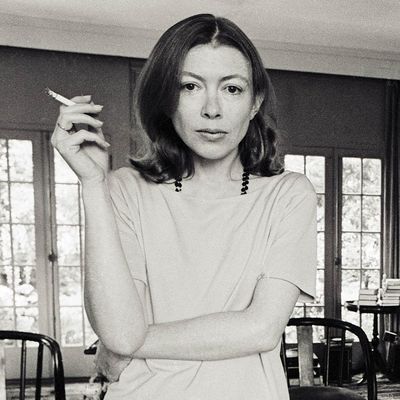
I’ll be honest, I wasn’t sure what I wanted out of a Joan Didion documentary. The writer and reporter and spiritual forebear of so many modern-day essayists is already possibly over-mythologized. She’s one of a very few literary figures whose name alone conjures a specific author photo when one mentions her: the brittle, pretty journalist, squinting with her perennial edge of discomfort among the hippies and burnouts of Haight-Ashbury. Without ever appearing to overtly try (unlike many of her male contemporaries, and at least a couple female ones), she cemented a kind of legend status as that very writer in the picture: the calm, seemingly unsentimental observer who kept her talent for understated heartbreak in her back pocket.
That image of her in the Haight, during the reporting for what would become come the title essay of her 1968 collection Slouching Towards Bethlehem, does show up in The Center Will Not Hold, a new film directed by her nephew, the actor Griffin Dunne. But despite being peppered with readings and a few amusing anecdotes, Dunne’s film is hardly a behind-the-scenes director’s-commentary companion to Didion’s bibliography. Rather, it assumes a working familiarity with her professional output so as to devote its attention primarily to the personal saga that ran alongside with and often intersected with it; primarily, her long marriage to John Gregory Dunne and the adoption and later tragic loss of her daughter Quintana Roo. Didion has written in almost unimaginable depth about both these losses (in 2005’s The Year of Magical Thinking, and 2011’s Blue Nights) but Dunne attempts a more conversational, candid approach to the life of an author who, despite the interiority of her writing, can often feel hard to know.
Based around interviews with Didion herself, as well as her contemporaries and devotees, The Center Will Not Hold is a loving late-career tribute that never feels overstated. It also never really attempts to interrogate her talent, or delve much into why she was the writer she was. Perhaps there’s no real answer to that, but it does feel as if an entirely separate film could be made about Didion the Writer, her experiences in the field and abroad, the origins of now-timeless essays. (There is one good story about how her early Vogue essay “On Self-Respect” came to be that left me wanting more like it.) Dunne glides over the middle period of her career during which she did more political and social reporting; the film is decidedly more interested in the early and late periods of Didion’s career, during which she was producing her most personal and celebrated work.
But that work is fantastic, and the film is appropriately affecting in the way it weaves it together. The Center Will Not Hold could have just been 90 minutes of Didion reading excerpts from her various classic essays over archival footage of New York City, Haight-Ashbury, Hollywood, and any of the other settings she came to inhabit over her long career. Their language is so readable, one hears them in a human voice even just on the page; Didion’s voice itself is matter-of-fact and sad and seemingly always resigned to the sentiment of the film’s title. The film opens with Didion discussing how frequently she’d seen the places and people she wrote about fall into disorder and destruction, foreshadowing her own series of losses late in life. But her ability to take in the chaos and darkness of the ’70s and find some kind of acceptance through her writing is what makes her as relevant as ever. By the time the film gets to her 2012 National Humanities Medal, presented to her by President Barack Obama, we are again reminded of the eventual dissolution of all things. And I’m sure I won’t be the only one to want to run to the bookshelf as soon as the film is over for a long overdue reread.

